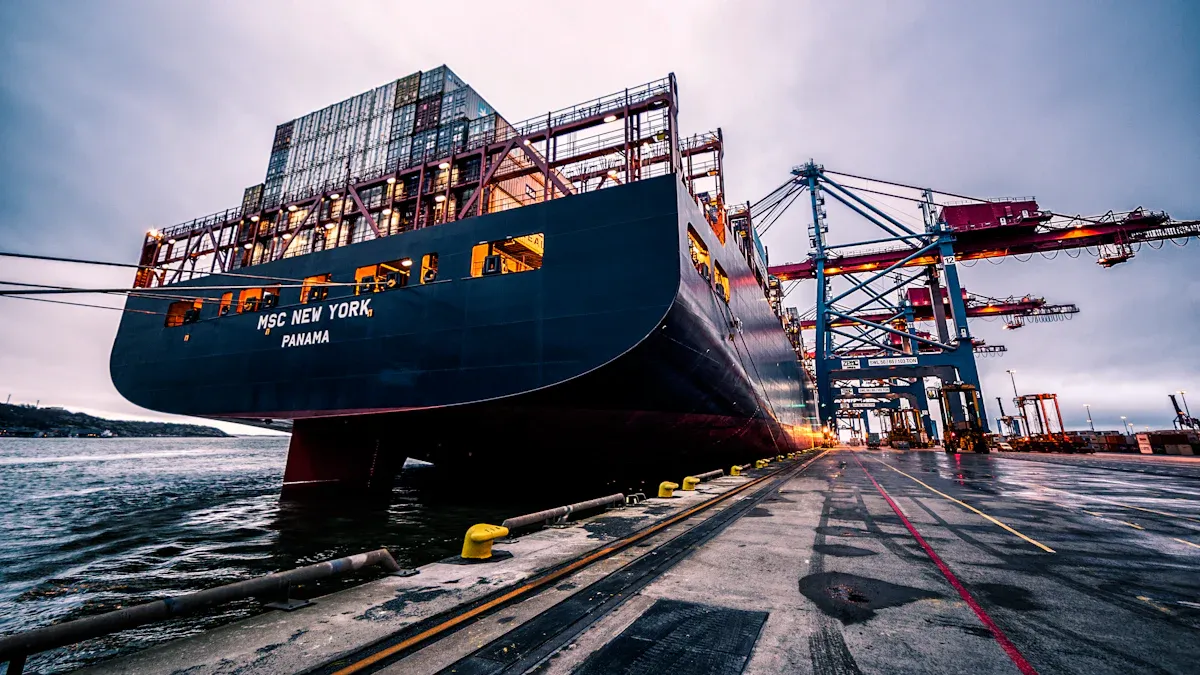Understanding Overseas Logistics Delivery Time Challenges

Efficient overseas logistics delivery time is crucial for global trade to function effectively. The increasing demand for online shopping and shipping necessitates improved delivery systems. Innovations such as live tracking and eco-friendly methods are transforming logistics. Air shipping has risen by 13%, while ocean shipping has grown by 9.3%. This underscores the significance of fast delivery for global business.
Key Takeaways
Know that distance and routes affect delivery times a lot. Plan paths well to avoid delays.
Customs checks may slow things down. Make sure forms are correct. Using customs brokers can help speed things up.
Pick the best shipping method for your needs. Air is quick but expensive. Rail is slower but cheaper.
Key Factors That Affect Overseas Shipping Times
Knowing what affects overseas shipping times helps improve your process. It also helps you set better delivery expectations. Things like distance and politics play big roles in how fast goods arrive.
Distance and Shipping Paths
The farther the destination, the longer shipping takes. Long distances often need tricky routes, adding time. Countries without sea access or near trade hubs face more problems. Studies show faraway places and no sea access mean higher costs and slower shipping.
Study Name | Main Findings | Sample Size | Time Frame |
|---|---|---|---|
How Distance Affects Global Trade | Trade data from 8 developing and 2 developed countries | 2008-2011 | |
Fading Distance Effects in Trade | Trade drops with distance and no sea access, raising costs. | Not mentioned | Not mentioned |
Distance and Poor Countries' Trade | Distance has hurt low-income countries since the 1970s. | 124 countries | 1970-2005 |
Rethinking Trade Models | Distance and bad infrastructure slow trade. | Not mentioned | Not mentioned |
Good planning and using different transport types can help. This makes deliveries faster.
Customs and Rules
Customs checks are another big reason for delays. Missing papers or breaking rules can slow things down. Over 30% of logistics companies say customs issues cause delays. Using customs brokers can cut wait times by 25%. They help follow rules and speed up the process.
To avoid customs problems, keep your papers correct. Also, learn about rule changes in the countries you ship to.
Transport Choices: Air, Sea, Rail, and Land
How you ship goods affects delivery time. Air shipping is fastest but costs more. Sea shipping is cheaper but slower, good for non-urgent items. Rail, like China-Europe Express Rail, is a middle option. It takes 15-20 days, faster than sea and cheaper than air. Land shipping works well for short trips or mixed transport plans.
Pick the best method based on speed, cost, and your goods.
Busy Seasons and Holiday Shipping
Holidays and busy times can slow down shipping. Carriers often struggle to stay on schedule during these times. For example:
Carrier | On-Time Rate (2024) | On-Time Rate (2023) |
|---|---|---|
FedEx | 91.8% | 98.3% |
UPS | 96.5% | 98.7% |
USPS | 90.4% | 96.5% |
Plan early for busy seasons to avoid delays. Try using different shipping methods or trusted carriers for better results.
Politics and Economy in Shipping
Politics and money issues also affect shipping. For example, in 2012, China and Japan had a conflict over islands. This caused boycotts and trade problems. Bad political ties raise hidden costs and slow trade. Good relations make trade easier and faster.
Economic troubles in places like Pakistan and Nigeria also hurt shipping. Watching these issues helps you plan for problems and adjust your plans.
Common Problems in International Shipping
Shipping goods overseas has many problems that can cause delays. Knowing these problems helps you plan better and avoid slow deliveries.
Customs Delays and Paperwork Mistakes
Customs checks often slow down shipping times. Missing papers or wrong product details can cause issues. Rules like health checks or permits also add time. To fix this, keep your documents correct and updated. Working with customs brokers can speed things up by 25%.
Common customs problems include:
Missing or wrong paperwork.
Mistakes in product details or prices.
Extra checks for safety or security.
Delays from following shipping rules.
Few Carriers for Overseas Shipping
Not enough carriers can slow shipping. Busy seasons or places with poor infrastructure make finding carriers hard. This leads to longer waits and higher costs. Using more carrier options and planning early can help solve this.
Weather Problems That Slow Shipping
Bad weather often delays shipments. Storms, strong winds, and extreme heat can cause accidents or slowdowns. For example, a study of 277 accidents showed bad weather caused crashes and other problems. Events like the Suez Canal blockage in 2021 delayed 7% of global shipping.
Example | How It Affected Shipping Times |
|---|---|
Study of 277 accidents (1990-2013) | Bad weather caused crashes and groundings, slowing deliveries. |
Roll-on/roll-off ships affected by moderate weather | Even small waves and winds caused risks for certain ships. |
Suez Canal blockage in 2021 | The Ever Given ship delay affected 7% of global trade. |
Supply Chain Problems and Poor Coordination
Supply chain delays happen when parts of the process don’t work together. Bad communication between suppliers, carriers, and warehouses causes missed deadlines. Without tracking tools, shipments can get lost or delayed. Using better technology can fix these problems.
Handling Surprise Delays in Shipping
Unexpected delays happen in overseas shipping. You can reduce their impact with smart planning. Storing goods near key markets speeds up delivery. Using third-party logistics (3PLs) helps with local shipping and saves money. Picking carriers that balance cost and reliability also lowers risks.
Ways to handle delays include:
Using local storage centers for faster delivery.
Working with 3PLs for flexible shipping.
Choosing carriers that are both affordable and reliable.
Fixing these problems makes shipping smoother and faster for international trade.
Solutions and Best Practices to Minimize Delays
Working with Trusted Providers like JUSDA
Picking a good logistics partner helps shipping run smoothly. A trusted provider like JUSDA offers services that fit your needs. They have over 155 service points worldwide and handle air, sea, rail, and land transport. JUSDA also provides extras like cloud storage and customs help. Partnering with them reduces delays and improves delivery speed.
Tip: Choose providers with experience in overseas shipping and tracking tools.
Using Technology for Tracking and Updates
Technology makes shipping faster and keeps customers happy. Real-time tracking uses tools like GPS and cloud systems. These tools show where goods are and spot problems early. They also help plan better routes for quicker deliveries.
Why real-time tracking is helpful:
Companies using it see a 25% rise in customer happiness.
Adding tracking tools to your shipping improves efficiency. It helps you fix delays quickly and builds trust with customers.
Preparing for Busy Shipping Seasons
Holidays and busy times can slow shipping. Planning ahead avoids these problems. Look at past data to find peak times. Book carriers early and mix shipping methods, like air and sea, to avoid delays.
Note: Early planning ensures on-time delivery during busy periods.
Mixing Shipping Routes and Methods, Including Rail
Using only one shipping method can cause delays. Mixing options helps avoid problems. Rail shipping is faster than sea and cheaper than air. JUSDA’s expertise in combining transport methods saves time and money.
Example: Rail and sea together can connect Asia to Europe quickly.
Using JUSDA’s China-Europe Express Rail for Faster Shipping
The China-Europe Express Rail by JUSDA is a fast and affordable option. It delivers goods between China and Europe in 15-20 days. This service is quicker than sea and cheaper than air. It works well for items like electronics and clothes. JUSDA handles customs smoothly, cutting delays.
Why Use This Service?
Faster than sea shipping.
Saves money on logistics.
Reliable with JUSDA’s strong network.
Using this rail service balances speed and cost, ensuring efficient delivery.
Setting Realistic Expectations for Shipping Times
Explaining Delivery Times Clearly to Customers
Telling customers clear delivery times builds trust. It also lowers frustration. Give accurate estimates and share updates during shipping. Use tools like messages or alerts to keep them informed. For example, FedEx sends real-time updates about changes. This has made customers happier.
Company | Strategy | Results |
|---|---|---|
FedEx | Sends updates and personal messages | Higher customer satisfaction with good feedback |
Real-time updates make customers less upset and more loyal. Being reliable helps you keep long-term customers.
Teaching Stakeholders About Shipping Delays
Suppliers and customers should know shipping can face delays. Things like customs checks, bad weather, or busy seasons can slow deliveries. Teach them about these issues using simple words and pictures. Share updates often to keep everyone informed.
Giving Flexible Shipping Choices
Offer different shipping options to meet customer needs. Fast shipping is good for urgent items. Standard shipping works for less urgent ones. Use air, sea, or rail to adapt to different needs. For example, JUSDA’s China-Europe Express Rail is faster than sea and cheaper than air. Flexible shipping makes customers happy and improves logistics.
Watching and Changing Delivery Estimates
Track shipments and update delivery times to avoid problems. Tools like UPS’s ORION system and DHL’s MySupplyChain help a lot. UPS saved fuel and cut pollution with ORION. DHL improved on-time deliveries by 15%. Amazon uses predictive tools to ship faster. These technologies make delivery times more accurate.
Tool/Case Study | Improvement Metrics |
|---|---|
UPS ORION System | Saved 10 million gallons of fuel yearly, cut costs by $300-$400 million, reduced CO2 by 100,000 tons |
Amazon Anticipatory Shipping | Faster deliveries with less waiting time |
DHL MySupplyChain | 15% more on-time deliveries, 20% fewer delays |
Updating customers shows you care about reliable service.

JUSDA Solutions
To provide you with professional solutions and quotations.
Delivery times for overseas shipping depend on many things. Distance, customs checks, and transport choices all play a role. You can solve problems like delays with smart planning.
Try using tools like RFID and blockchain for tracking.
Work with companies like JUSDA to combine shipments and save money.
These steps lower costs, improve speed, and set clear delivery timelines.
See Also
Addressing Global Supply Chain Growth Challenges Effectively
Enhancing Supply Chain Strategies for Advanced Manufacturing Challenges
Utilizing Robotics in Logistics to Boost Warehouse Efficiency
Exploring JUSDA's Innovative Logistics Solutions for Tech Manufacturing
Transforming Future Logistics Through Artificial Intelligence Innovations
